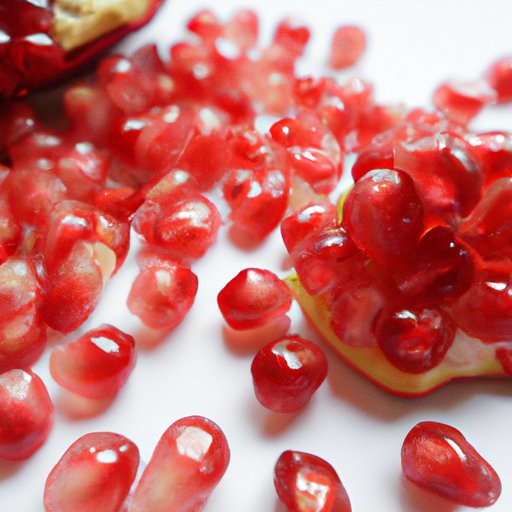
Are You Supposed to Eat the Seeds in a Pomegranate? Exploring the Facts and Their Benefits
Pomegranates are such a delightful and interesting fruit. The deep red color, the unique taste, and the challenging way to eat them make this fruit quite a mystery to some people. One of the most common questions that pomegranate lovers ask about this fruity delight is whether you should eat the seeds or not. In this article, we aim to explore the facts about the nutritional value and health benefits of pomegranate seeds, while also addressing some common misconceptions.
Exploring the Nutritional Value of Pomegranate Seeds
First things first, let’s start with why you should consume those pesky seeds. Pomegranate seeds may seem insignificant, but these tiny jewels pack a nutritional punch. Packed with fiber, vitamins C and K, and polyphenols – they are indeed a nutritional powerhouse. A cup of pomegranate seeds is relatively low in calories, containing around 144 calories per cup, and provides around 7 grams of fiber. The seeds are also a good source of vitamin C, providing about 30% of the recommended daily value per cup. Also, pomegranate seeds are rich in antioxidants such as flavonoids and pigmented anthocyanins, which help fight against free radicals.
Debunking Common Myths About Consuming Pomegranate Seeds
There is a popular misconception that pomegranate seeds are not safe for consumption, as they can lead to obstruction in the digestive system. But that is nothing but a myth. The edible seeds of pomegranates are generally considered safe to eat and do not pose any health risks. The outer shell of the seed contains fiber, which is known to promote overall gut health! So don’t worry about swallowing those tiny seeds, and consume them without any hesitation.
Celebrating the Versatility of Pomegranate Seeds in Cooking & Baking
One of the most exciting things about pomegranate seeds is that they are versatile when it comes to cooking and culinary uses. The seeds can be used in both sweet and savory dishes, and the juice can be used as a tangy dressing or marinade. For instance, you can use them as toppings for your morning yogurt or add them to a smoothie for an extra boost of flavor and nutrition. Pomegranate seeds are also perfect for salads, and you can use them as a topping for roasted vegetables or spread them over meat dishes. Given their tangy and slightly sweet flavor notes, they can give any bland dish a burst of flavor.
Here are a few quick and simple recipes to experiment with:
Pomegranate Yogurt Bowl
Take some Greek yogurt of your choice, drizzle with honey and add a tablespoon or two of pomegranate seeds. Top it off with granola or nuts of your preference. Eat it for your breakfast, and it will leave you full and satisfied for hours.
Pomegranate-Jalapeño Salsa
Mix chopped pomegranate seeds, diced jalapeño, red onion, bell pepper, and cilantro in a bowl. Squeeze some fresh lime juice and add salt and pepper according to taste. And there you have it – a perfectly sweet, spicy, and tangy salsa that pairs well with nachos, tacos, or grilled meats.
Discussing Potential Health Benefits of Eating Pomegranate Seeds
Pomegranate seeds are also believed to have several health benefits. Polyphenols and flavonoids, which are the primary antioxidants found in pomegranate, can help to protect our cells and maintain overall health. Pomegranate seeds are also known to improve digestion, reduce inflammation in the body, protect against certain types of cancer, and promote healthy blood pressure. Studies have also shown that eating pomegranates or drinking pomegranate juice may have a positive impact on cognitive function, improving memory and attention levels in people with memory deficits.
Surveying Different Cultural Traditions Surrounding Pomegranate Consumption
Pomegranates have a rich cultural history, and are used extensively in different cuisines worldwide. In some countries like Greece, Turkey, and Iran, pomegranates are traditionally eaten during the New Year to symbolize abundance and fertility. In Ancient Egyptian times, pomegranates symbolized life and rebirth, and ancient Greeks believed they represented the fruit of the dead. The fruit also features prominently in Judeo-Christian traditions, where it is said to represent knowledge and wisdom. Hence, the historical significance and cultural relevance of pomegranates make it a special fruit worldwide.
Providing Simple & Creative Tips on How to Extract & Enjoy Pomegranate Seeds
Eating pomegranate seeds can be a bit tricky, but here are some simple tips to extract and consume them without hassle:
- First, cut around the top of the pomegranate with a small knife. Cut deep enough to peel off the crown.
- Mark the fruit into quarters from the top to the bottom with a knife, cutting just deep enough to be able to peel back the skide
- Use a bowl of water to submerge the fruit as you pull the seeds apart with your fingers.
- The seeds will sink to the bottom of the bowl, and you can remove any inedible pulp or rind that floats to the top.
Don’t be fooled by pomegranate seeds’ small size. These tiny edible seeds pack a punch of taste and health value. Incorporate them into your diet in any way possible, and enjoy their health benefits.
Conclusion
Pomegranate seeds are not just safe, but incredibly valuable when it comes to nutrition and taste. They can be consumed in various ways and are highly recommended for a healthy and balanced diet. With their history dating back to ancient times, they also have great cultural significance worldwide.





